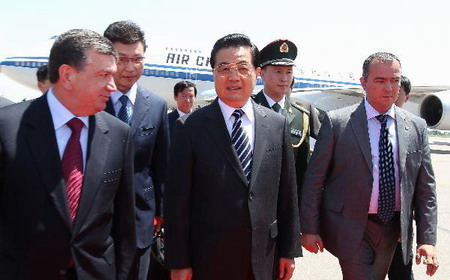Foreign and Military Affairs
China, Uzbekistan pledge to combat terrorism jointly
By Wu Jiao and Li Xiaokun (China Daily)
Updated: 2010-06-10 07:00
 |
Large Medium Small |
|
|
TASHKENT - President Hu Jintao and his Uzbek counterpart pledged on Wednesday to jointly combat terrorism, a major concern for both countries.
| ||||
In July last year, riots led by the group in Urumqi, capital of Xinjiang Uygur autonomous region, killed at least 197 people, most of them Han residents, and injured more than 1,700 in the bloodiest violence in the history of New China.
Many members of the ETIM, which has been labeled a terrorist group by the UN Security Council, are still active in Central Asia, including Uzbekistan.
Hu told Karimov he hopes the security departments of both sides collaborate closely to maintain regional stability.
The Uzbek president said his country adheres to the one-China policy and supports Beijing's efforts to combat the "three evil forces".
Li Wei, director of the anti-terrorism research center at the China Institute of Contemporary International Relations, said the two countries have huge potential for collaboration in the sharing of information and security operations.
"Joint efforts by Beijing and Tashkent will help combat ETIM activities in Central Asia," he said.
Chinese Ambassador to Uzbekistan Yu Hongjun told Xinhua earlier that senior security officials from both countries "maintain contacts and have fruitful cooperation", adding that the two presidents met twice last year.
Hu and Karimov on Wednesday attended a ceremony where 8 agreements on trade, investment, hi-tech, energy and food safety worth $200 million were signed.
Their talks also touched upon the situation in Kyrgyzstan and Afghanistan, as well as energy collaboration.
Hu is in Central Asia's biggest city for a state visit and Friday's annual summit of the Shanghai Cooperation Organization (SCO). He will later visit Kazakhstan.
Founded in 2001 in Shanghai, the SCO groups China, Kazakhstan, Kyrgyzstan, Russia, Tajikistan and Uzbekistan. Mongolia, Pakistan, Iran and India are observer states.
Afghan President Hamid Karzai has also been invited to this year's summit.












